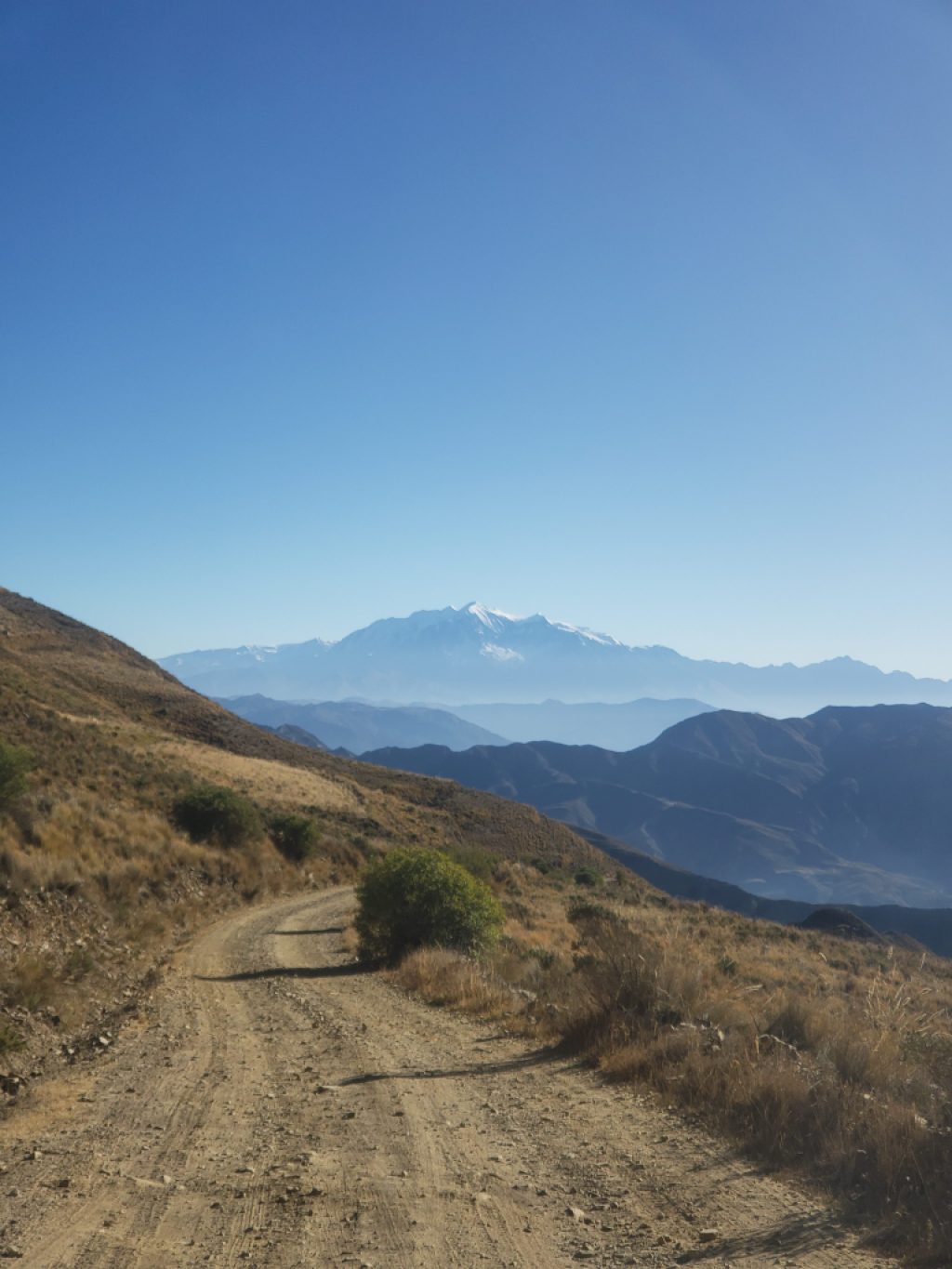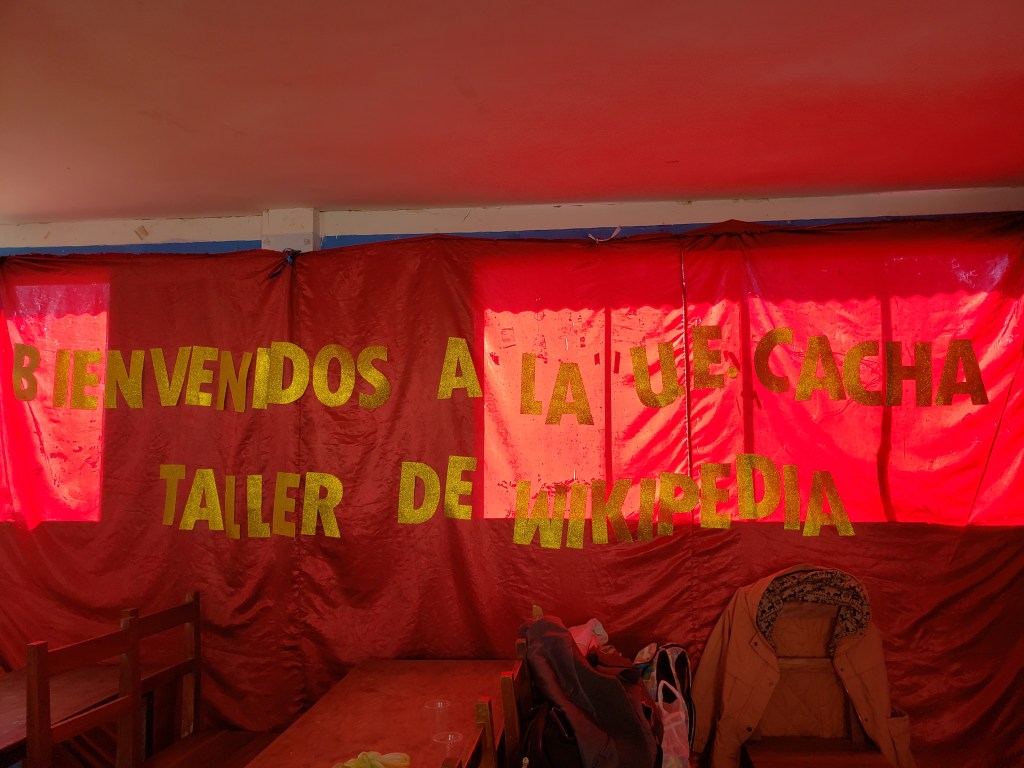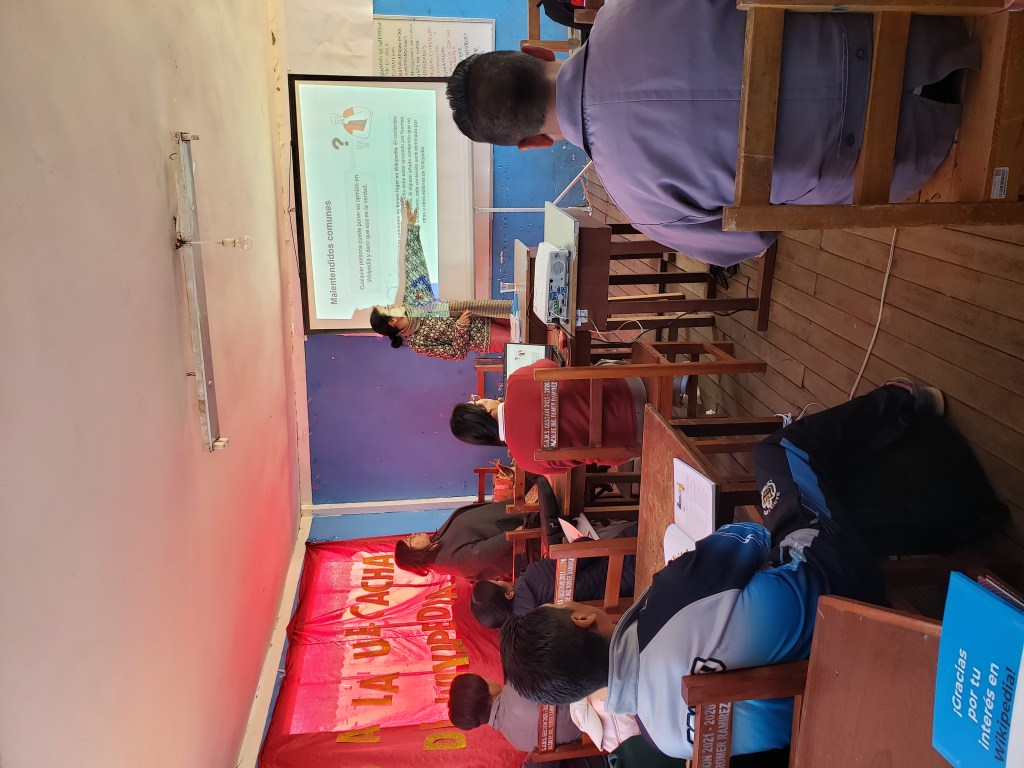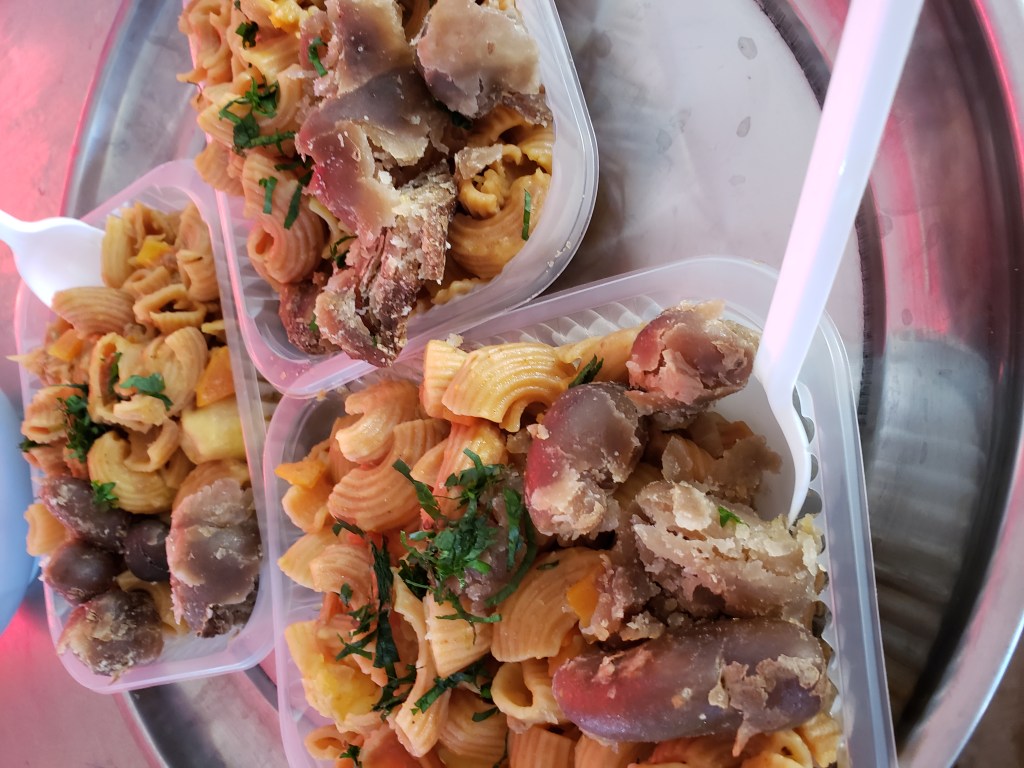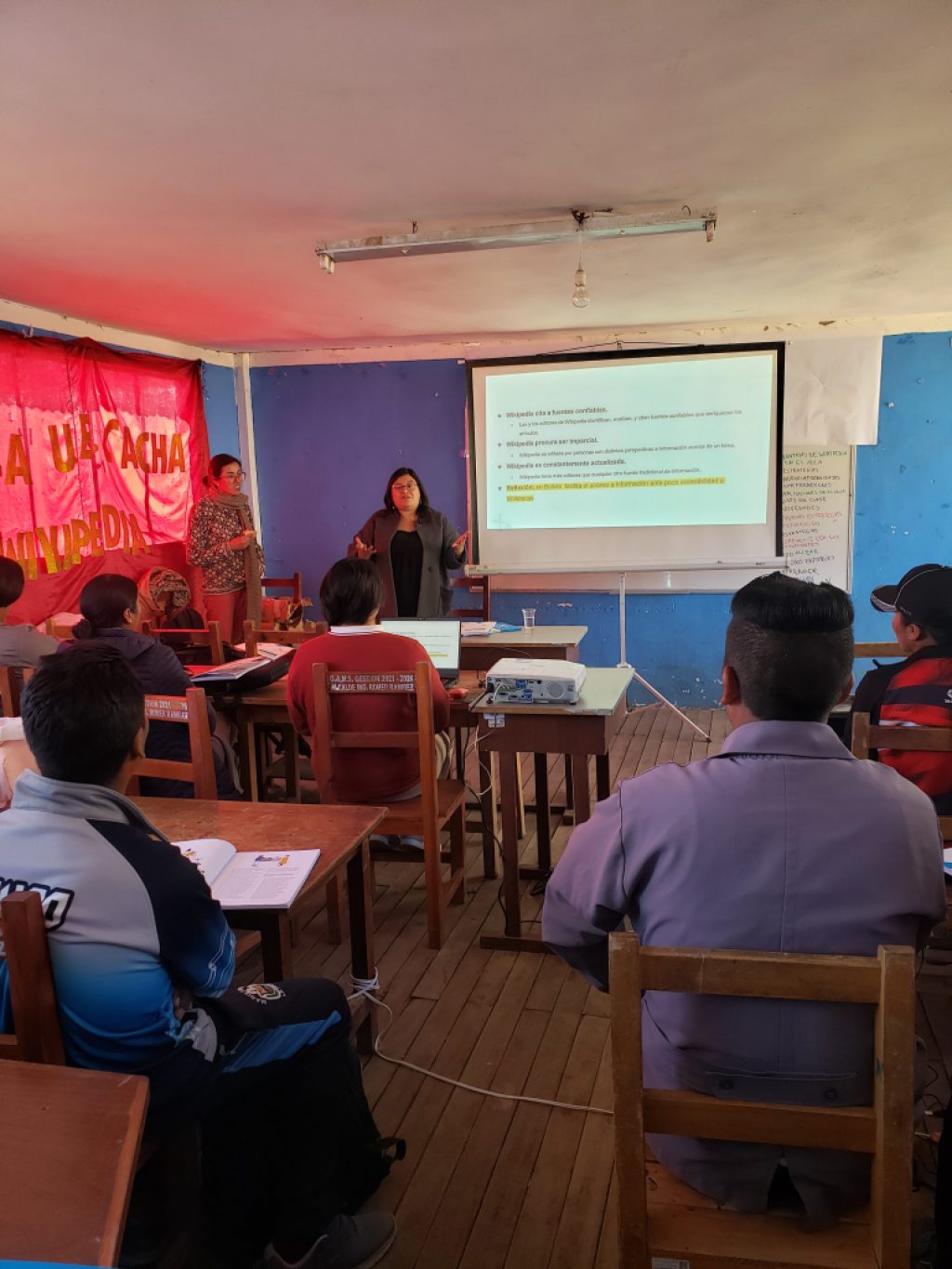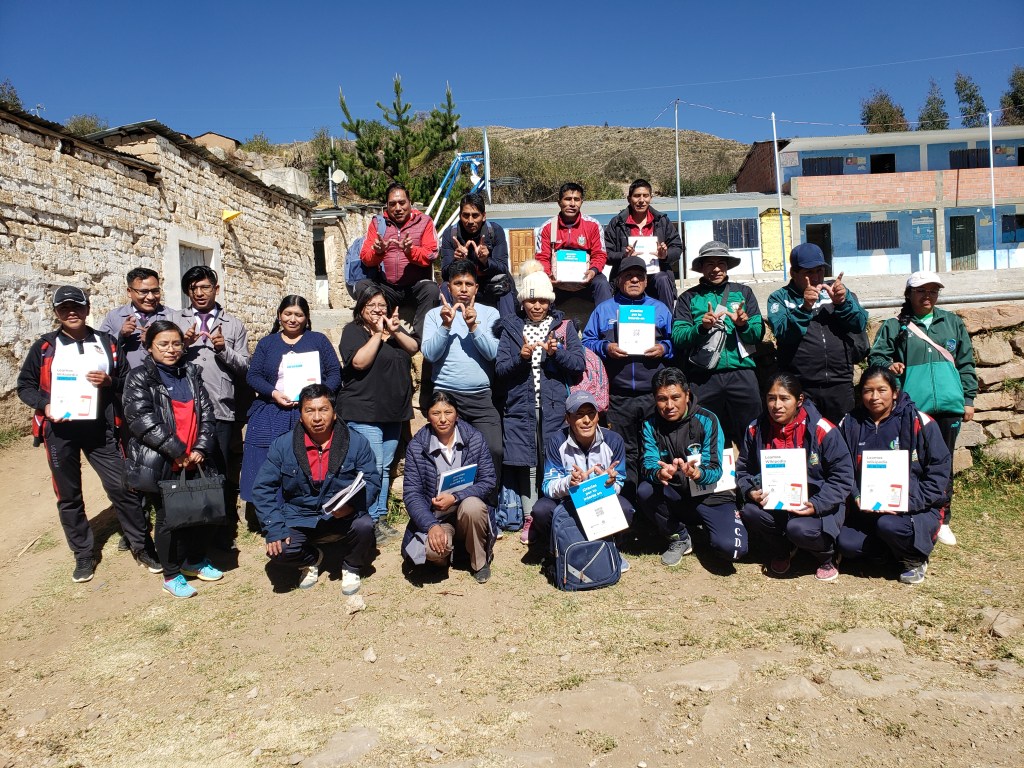Not too much is generally known about the Sapahaqui Municipality, although most Bolivians have likely passed by the sign that marks its location at least once. Leading there, a long and straight road turns into a sinuous dirt road with dangerously tight curves.
The first part of the journey was to get to the road that lead to Sapahaqui from Ciudad Satélite, in El Alto. From there, an initially quiet drive turned into a two-hour journey into a valley ripe with produce: prickly pears, peaches, onions, and lima beans, the region’s flagship product.
This was the last of the six wikijornadas (wiki-days) that were planned for the town of Sapahaqui, as a part of the Aprendizajes y Educación (Learning and Education) program, by Wikimedistas de Bolivia, in coordination with the District Department of Education, and with the support of educator Hugo Javier Yujra Chura, and councilpersons Rosmery Flores Tola and Oscar Bueno Tejada. Nine schools participated in these Wikijornadas: Barrientos Ortuño, Taconbanaba, Cobija de Kahata, Chivisivi, San Marcos, Khola, Ayahuacayo, Cacha, and Huancane.
After visiting two other communities, the team arrived to Cacha, after having gotten lost on the road after a turn that councilman Oscar Bueno, who was at the wheel, wrongly took. In the valley of Cacha, nearly 30 local teachers were expecting.
After arrival, the materials, books, and other things for the event were prepared. One of the first tasks was to check the Internet connectivity on the field, which was optimal. This is always good news, because a good connection implies that teachers regularly use the Internet, not a small feat for a country like Bolivia, where only 80% of the territory has access to the web, with rural areas being the least connected due to economic, structural, and political issues.
Meals are part of the traditions of the Aymara, a moment to share and eat calmly, with no rush. The team was welcomed to Cacha with a plate of fideos uchu (noodle stew) and a greeting banner, as well as the teacher’s enthusiasm.
After introducing the members of the team, the event took off. During these wikijornadas many topics were discussed, with a focus on context-sensitive issues. Furthermore, the alliance that was reached between Wikimedistas de Bolivia and the municipality will allow for the implementation of the program “Mi Municipio en la Wiki” (“My Town on Wiki”) in Sapahaqui.
The whole team collaborated in various activities. Two people (Olga Paredes and Carla Salazar) were responsible for managing contents and assisting the teachers. Librarian Vania Graneros participated too, adding to topics she identifies as important, and collaborating with the presentations. Naira Abal took charge of records and photography, identifying the event’s highlights for social media.
Teacher Rhonny Condori Huanca said (in Aymara): “During this event we, as teachers, were able to learn about the different uses the Wikipedia has, and how it’s an Internet community that grows by the day. As teachers, we can be part of that freely, and as Bolivians we could produce enough information about our culture, information that now remains somewhat hidden, and that could be shown to the world through Wikipedia articles”.
The participation of very young teachers who already knew Wikipedia was encouraging, and while they had some reservations regarding its use and edition, they showed sincere interest in integrating new tools to their classrooms, along with a critical perspective. Towards the end of the first part of the session, the teachers expressed their concerns about limited access to specific documentation on diverse topics, something that affects the ability to edit Wikipedia with referenced information. It was also noted that it is important to implement a method to record and publish oral accounts as sources, respecting the customs and habits of the region.
Teachers in sparsely populated municipalities distribute their time among various activities, besides the commuting time between communities. Although this meant the time that had been scheduled for the event was reduced, the participants agreed to complement the missed time in online activities.
This year a lot was learned to guide the reformulation of the event, and therefore adapt the Reading Wikipedia in the Classroom program to our context, a long but fruitful journey. As the results of the work are published, the first Class Programs implementing the use of Wikipedia in classrooms were being elaborated and presented to their communities. Some teachers even put forward programs in Aymara language.
Module 1 teacher’s handbook for the Reading Wikipedia in the Classroom program is available in Aymara, Quechua, and Guarani languages, as a way to open the program and the movement for people to use in their own language. These versions can be downloaded on the following links:
Follow to keep up with the work in Bolivia!
Facebook: WikimediaBolivia
Twitter: Wikimedia_BO
Instagram: Wikimedia_Bo
Website: wikimedia.org.bo
Youtube: @wikimediabolivia
Whatsapp: https://bit.ly/WikiClic

Can you help us translate this article?
In order for this article to reach as many people as possible we would like your help. Can you translate this article to get the message out?
Start translation
